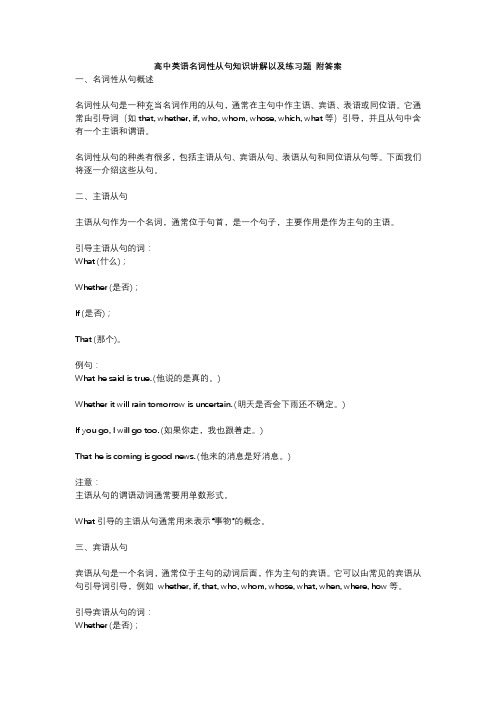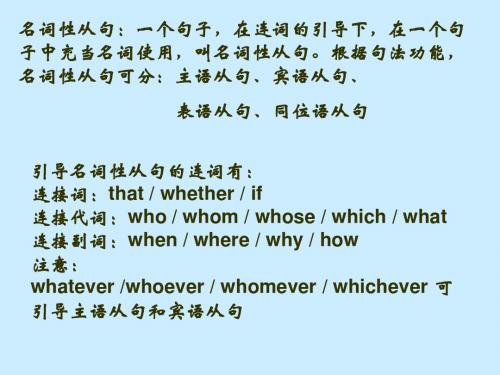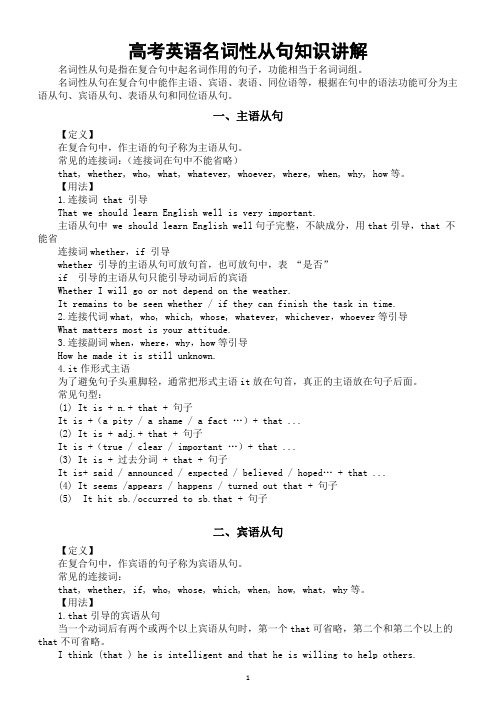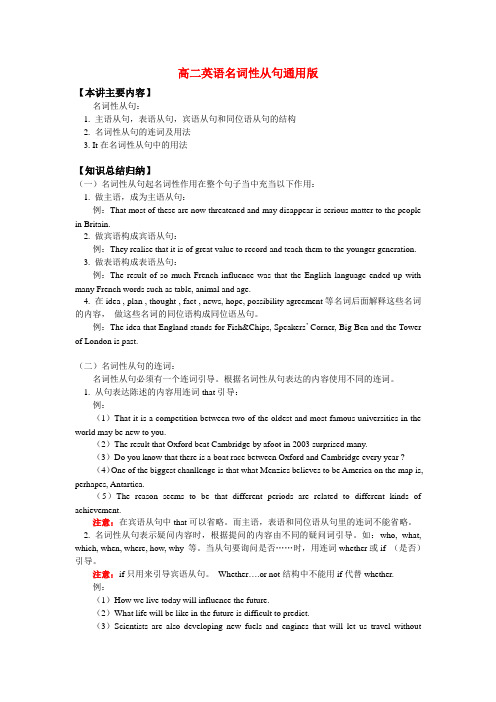高二英语 名词性从句
高中英语名词性从句知识讲解以及练习题 附答案

高中英语名词性从句知识讲解以及练习题附答案一、名词性从句概述名词性从句是一种充当名词作用的从句,通常在主句中作主语、宾语、表语或同位语。
它通常由引导词(如that, whether, if, who, whom, whose, which, what等)引导,并且从句中含有一个主语和谓语。
名词性从句的种类有很多,包括主语从句、宾语从句、表语从句和同位语从句等。
下面我们将逐一介绍这些从句。
二、主语从句主语从句作为一个名词,通常位于句首,是一个句子,主要作用是作为主句的主语。
引导主语从句的词:What (什么);Whether (是否);If (是否);That (那个)。
例句:What he said is true. (他说的是真的。
)Whether it will rain tomorrow is uncertain. (明天是否会下雨还不确定。
)If you go, I will go too. (如果你走,我也跟着走。
)That he is coming is good news. (他来的消息是好消息。
)注意:主语从句的谓语动词通常要用单数形式。
What引导的主语从句通常用来表示“事物”的概念。
三、宾语从句宾语从句是一个名词,通常位于主句的动词后面,作为主句的宾语。
它可以由常见的宾语从句引导词引导,例如whether, if, that, who, whom, whose, what, when, where, how等。
引导宾语从句的词:Whether (是否);If (是否);That (那个);Who (谁);Whom (谁);Whose (谁的);What (什么);When (何时);Where (何处);How (如何)。
例句:I know that he is coming. (我知道他要来。
)I wonder if he is telling the truth. (我想知道他是否说了真话。
人教版高中英语高二语法 名词性从句

I have heard the news that he visited our factory . I have heard the news that he told you the other day . 同位语从句和定语从句的区别: 同位语从句和定语从句的区别: 1 同位语从句 同位语从句——that 只起连接作用,不作任何成分 只起连接作用, 是关系代词, 定语从句 —— that 是关系代词,起连接作用和充 当宾语和主语 2同位语从句 同位语从句——同位语从句和前面的名词是同位关系, 同位语从句和前面的名词是同位关系, 同位语从句 同位语从句和前面的名词是同位关系 对名词进行补充说明 定从和前面的名词是所属关系, 定语从句 ——定从和前面的名词是所属关系,对 定从和前面的名词是所属关系 名词进行修饰, 名词进行修饰,加以限定 3同位语从句 同位语从句——that 不能省 同位语从句 在从句中作宾语时, 定语从句 ——that 在从句中作宾语时,可以省
11 We made the suggestion that he ___ his work . B A continues B continue C continued D had continued
1 ____made the school proud was ____more than B 90%of the students had been admitted to key universities . A What / because C That / what B What / that D That / because
4同位语从句:从句在句中充当同位语成分,其一般跟 同位语从句:从句在句中充当同位语成分, 同位语从句 在一些抽象名词( 在一些抽象名词( idea / belief / fact / truth / problem / news 等)后面,对名词作进一步解释说明 后面, 引导或用连接副词when / 同位语从句常用 that 引导或用连接副词 where/why / how / whether The idea that computers can recognize human voices surprises many people . I have no idea when she will be back . Word came that Napoleon himself was coming to inspect them .
高二英语名词性从句知识精讲

高二英语名词性从句知识精讲高二英语名词性从句知识精讲人教版一. 本周教学内容:第五单元语法:名词性从句1. 名词性从句2. 同位语从句3. 同位语从句与定语从句的辨析4. what; whatever; whoever; where引导的名词性从句5. it 作为形式主语的句型二. 知识总结与归纳:(一)名词性从句的结构:名词性从句起名词作用在句中做主语,表语,宾语和同位语构成:主语从句;表语从句;宾语从句和同位语从句。
引导名词性从句的连词有三类:that;whether; wh-疑问词。
例句:1.The result of this French influence was that the English language ended up with many French words such as table, animal and age.2. They realize that it is of great value to record and teach them to the younger generation.3. I want to tell the reader that these hills and fields are most beautiful, with many small and clear rivers, and rich fields bearing fruit and grain.4. Some people feel that Wales is an ancient fairy land.5. What interested him was that the whole world had been mapped 70 years before Columbus.6. What is certain that the book has made many people think about the achievements of Zheng He and other Chinese captains and their role in discovering the world.7. That most of these are now threatened and may disappear is a serious matter to the people in Britain.8. This gave him the idea that the Chinese perhaps first discovered America.(二)同位语从句在名词idea; fact; news; thought; suggestion/advice; problem; proof等词后面带上that+陈述句这部分从句解释了前面的那些名词所指的内容,与那些名词起着同等作用的句子成分,叫同位语从句。
高中英语2024届高考名词性从句知识分类讲解(主语从句+宾语从句+表语从句+同位语从句)

高考英语名词性从句知识讲解名词性从句是指在复合句中起名词作用的句子,功能相当于名词词组。
名词性从句在复合句中能作主语、宾语、表语、同位语等,根据在句中的语法功能可分为主语从句、宾语从句、表语从句和同位语从句。
一、主语从句【定义】在复合句中,作主语的句子称为主语从句。
常见的连接词:(连接词在句中不能省略)that, whether, who, what, whatever, whoever, where, when, why, how等。
【用法】1.连接词 that 引导That we should learn English well is very important.主语从句中 we should learn English well句子完整,不缺成分,用that引导,that 不能省连接词whether,if 引导whether 引导的主语从句可放句首,也可放句中,表“是否”if 引导的主语从句只能引导动词后的宾语Whether I will go or not depend on the weather.It remains to be seen whether / if they can finish the task in time.2.连接代词what, who, which, whose, whatever, whichever,whoever等引导What matters most is your attitude.3.连接副词when,where,why,how等引导How he made it is still unknown.4.it作形式主语为了避免句子头重脚轻,通常把形式主语it放在句首,真正的主语放在句子后面。
常见句型:(1) It is + n.+ that + 句子It is +(a pity / a shame / a fact …)+ that ...(2) It is + adj.+ that + 句子It is +(true / clear / important …)+ that ...(3) It is + 过去分词 + that + 句子It is+ said / announced / expected / believed / hoped… + that ...(4) It seems /appears / happens / turned out that + 句子(5) It hit sb./occurred to sb.that + 句子二、宾语从句【定义】在复合句中,作宾语的句子称为宾语从句。
高中英语语法名词性从句

规律一:名词性从句在句中要用陈述语序
II.引导词的选择
1. ____ we can't get seems better than ____ we
have. A.What , what C. That , that
B. What , that D. That , what
2. It worried her a bit ____ her hair was turning grey. A.while C.if B.that D.for
规律四:主语从句和宾语从句在适当的情况 下可以借助 “it” 而后置。
1.主语从句可以用it (作形式主语) 来替换成以下几种结构表达。 (A)It is clear/certain/likely /true/surprising that… (B)It is a pity/shame /good idea/no wonder that ...
The question of whether they are male or female is not important. I have not decided whether to go or not.
⑥ whether可引导一个让步状语从句表示 “不管”、“无论”,而if不能,但可以 引导一个条件状语从句表示“如果”如:
• (4)同位语从句 • 就是在句中作同位语的从句。它通常有放在thought, idea, news, word(=news), plan, doubt, question, fact, suggestion, belief等抽象名 词的后面,说明这些词的具体内容或含义。同位语从句大多由that引 导,也可由whether, how, when, where, why等引导,但不能由which 引导。如: • The idea that the earth is round is not a new one. “地球是圆的”这种 观点并不新鲜。He must answer the question whether he agrees to it or not. 他必须回答他是否同意此事这们一问题。 • I have no idea when he will set out. 我不知他什么时候出发。 • 注:有时,同位语从句并不紧跟在它所说明的词的后面。如: • The whole truth came out at last that he was a wolf in sheep’s clothing. 真相终于大白了,他原来是一只披羊皮的狼。
高二英语名词性从句通用版知识精讲

高二英语名词性从句通用版【本讲主要内容】名词性从句:1. 主语从句,表语从句,宾语从句和同位语从句的结构2. 名词性从句的连词及用法3. It在名词性从句中的用法【知识总结归纳】(一)名词性从句起名词性作用在整个句子当中充当以下作用:1. 做主语,成为主语从句:例:That most of these are now threatened and may disappear is serious matter to the people in Britain.2. 做宾语构成宾语从句:例:They realise that it is of great value to record and teach them to the younger generation.3. 做表语构成表语丛句:例:The result of so much French influence was that the English language ended up with many French words such as table, animal and age.4. 在idea , plan , thought , fact , news, hope, possibility agreement等名词后面解释这些名词的内容,做这些名词的同位语构成同位语丛句。
例:The idea that England stands for Fish&Chips, Speakers’ Corner, Big Ben and the Tower of London is past.(二)名词性从句的连词:名词性从句必须有一个连词引导。
根据名词性从句表达的内容使用不同的连词。
1. 从句表达陈述的内容用连词that引导:例:(1)That it is a competition between two of the oldest and most famous universities in the world may be new to you.(2)The result that Oxford beat Cambridge by afoot in 2003 surprised many.(3)Do you know that there is a boat race between Oxford and Cambridge every year ?(4)One of the biggest chanllenge is that what Menzies believes to be America on the map is, perhapes, Antartica.(5)The reason seems to be that different periods are related to different kinds of achievement.注意:在宾语从句中that可以省略。
高二英语名词性从句
• whether/if
• 一般疑问句转化而来---有词义,但在从句中不担任成分
• wh-词
• 特殊疑问句转化而来---有词义,在从句中担任成分
• I told him that I would come back soon. • Whether we will succeed is still a question. • Who he is has nothing to do with you.
同位语从句 引导词that只起连接 的作用不充当句子成 分
定语从句 引导词that除了引导句 子外还充当一定的句子 成分
同位语从句与前面的名 定语从句对先行词起修 词是同位关系表示这个 饰作用,表示“…的”。 名词的内容 同位语从句的that 一般不能省 而定语从句中的关系代 词that,当其在从句中 做宾语时,常常可以省 略
I don’t know whether or not she’ll like it.
三. 表语从句
表语从句的引导词与主语从句和宾语 从句相同. 但: 1. that引导表语从句时不能省.
2. if不能引导表语从句.
四. 同位语从句 同 位 语 从 句 一 般 跟 在 名 词 fact, news, idea, suggestion 等后面 , 用以说明或 解释前面的名词.
3.Dr. Black comes from either Oxford or
Cambridge, I can't remember ____.
A.where
C.which
B.there
D.that
4.Energy is ____ makes things work.
A.What
高中英语语法---名词性从句详解
名词性从句详解名词性从句包括主语从句、表语从句、宾语从句、同位语从句。
其关联词有连接词that,if,whether;疑问代词who,what,which和疑问副词when,where,how,why等。
一.语法讲解1.主语从句主语从句在句中做主语。
它可以放在主句谓语动词之前,但多数情况由it作形式主语,而把主语从句放在主句之后。
例如:Who did that is known to all.It is interesting that you should like him.2.表语从句表语从句在句中作表语,位于主句中的系动词之后。
如:The question is who can complete the difficult task.表语从句不能用if引导,但可用as if引导。
例如:He looked as if he was going to cry.3.同位语从句同位语从句跟在名词后面,进一步说明该名词的具体内容。
引导同位语从句的名词主要有fact,news,promise,idea,truth等。
连接词用that(不用which),及连接副词how,when,where,why等。
例如:His delay is due to the fact that the car went wrong halfway.The news that our team has won the match is true.She asked the reason why there was a delay.4.宾语从句1.宾语从句在句中作及物动词或介词的宾语。
例如:We can learn what we did not know.He will talk to us about what he saw in the U.S.如果主句的谓语动词是及物动词make,find,see,hear等,则把宾语从句置于宾语补足语之后,用it作为形式宾语。
高中英语语法——名词性从句
①that 引导同位语从句时,是连词,不作成分,只起连接作用,that不能省。 that 引导定语从句时, 是关系代词,作主语或宾语。作宾语时常可以省略。 ②定语从句的先行词可以是任何名词或代词;同位语从句前面的名词必须是 抽象名词,常考的有消息(news/ word/ information/ message)、事实(fact/ truth)、 观点(opinion/ view/ thought/ idea/ belief)、希望(hope/ wish)、问题(question/ problem/ doubt)、请求(request/ requirement/ demand/ desire)、建议(advice/ suggestion/ recommendation/ proposal)、承诺(promise)等。
who/ whoever的区分 whoever强调的是人,who表示疑问谁
_W__h_o_e_v_e_r__ could solve the problem will be rewarded. __W__h_o_____ will solve the proble is unknown. __W__h_o_e_v_e_r_ breaks the law, he will be punished.
高二英语Unit5名词性从句知识精讲
高二英语Unit5名词性从句知识精讲高二英语Unit5名词性从句知识精讲定义:在句子中起名词作用的句子叫名词从句(Noun Clauses)。
名词从句的功能相当于名词词组,主语: His job is importantWhat he does is important.表语: This is his job.This is what he does every day.My idea is that we should help her do housework everyday.名词性从句在复合句中能担任: 主语、宾语(介词宾语)、表语、同位语,因此,根据它在句中不同的语法功能,可分为:主语从句、宾语从句、表语从句和同位语从句。
注意:1.从句一律保持陈述语序。
2. 名词性从句可以表示:事实和问一、引导名词性从句的连接词可分为三类:连接连词:that, whether, if , as if ,because(不充当从句的任何成分,且that 也没有任何意义)连接代词:what, whatever, who, whoever, whom, whose, which.连接副词:when, where, how, why二、名词性从句的注意事况1、what与that 的区别:that 和 what 都可引导所有的名词从句。
但是,what除起连接作用外,还在名词性从句中充当成分,表示说的、做的、想的等内容,可做从句的主语、宾语、或表语。
而that在名词性从句中不充当任何成分,只起连接作用。
Eg.That he stole a bike was true. 他偷了一部自行车是真的The important thing is what you do , but not what you say .重要的是你做什么,而不是说什么。
Practice:1.what he wants is a book.2. That he wants to go there is obvious.3.The result is that we won the game.4.This is what we want to know.8. I have no idea what he did that afternoon.2.that不可省略的情况:a. 主语从句、表语从句和同位语从句b.用it做形式宾语的宾语从句c.并列的宾语从句中的后几个从句的引导词that 不能省略3、whether 和 if 的区别是: (在下列情况下,whether 不能被if 取代)a. 主语从句b. 表语从句Unit4c. 同位语从句e. 介词后的宾语从句只能用“whethr”, (一般可以互换)f. whether to do 做动词宾语不能用if to do.(whether也可与动词不定式连用但if不能)g .whether or not 连在一起引导宾语从句时不用if.名词性从句作:一、主语从句:从句在句中充当主语成分,1. 通常放在主句谓语动词之前 *Eg.1). That he will succeed is certain .2) Whether he will go there is not known .3) What he said is not true .4) Where he hid the money is to be found out .5) Whoever comes is welcome.2. 也可以由形式主语it 来代替,而将主语从句放在句末。
- 1、下载文档前请自行甄别文档内容的完整性,平台不提供额外的编辑、内容补充、找答案等附加服务。
- 2、"仅部分预览"的文档,不可在线预览部分如存在完整性等问题,可反馈申请退款(可完整预览的文档不适用该条件!)。
- 3、如文档侵犯您的权益,请联系客服反馈,我们会尽快为您处理(人工客服工作时间:9:00-18:30)。
C.go
D.were allowed to
同位语从句和定语从句的区别:
如果that作从句中的某一成分,则是定语从句,如 果that不作从句中的任何成分,则是同位语从句.
(1). I had no idea that it was too late.
(2).I still remember the place that we visited last year.
在同位语从句中当名词为advice、 order、suggestion、proposal时, 后面的同位语从句应使用虚拟语 气,谓语v.用(should)+V.。
1.The suggestion thBat he _____ at the
meeting was agreed to by most people.
(3)由疑问词who,what, where,when, how等引导。
eg:1.The question who should do the work requires consideration .
2.We haven’t settled the question where we are going to spend our summer vacation.
egs:I’ve no idea that Kate has been to shanghai.
同位语从句
The book (that) I bought yesterday was written by LuXun.
定语从句
He can’t answer the question how he got the money.
主语从句 (the subject clause)
一.概念
在复合句中用作主语的从句叫做主 语从句。
二.引导主语从句的关联词:
1. that引导,通常that不可以省略
That he will win is certain.
2. whether 引导(不能用if) Whether he’ll join us in the discussion
1. The fact is __th_a_t_ she doesn’t like pop music.
2. My trouble is _t_h_a_t_ I don’t have enough
experience.
3. The question is _w_h_e_t_h_e_r he will be present
2.He thought it surprising that Jean had failed the exam.
表语从句 (the Predicative Clause)
一.概念
在复合句中用作表语的从句叫做表 语从句。
1. that引导 The reason is that I’ve been too busy these days. 2. whether 引导(不能用if) The question is whether they have enough money on hand.
(你错过了这次机会)
that 无意义, 后接一个完整的句子.
注意点:
1).主语从句一律用陈述句语序 例: 正: When he will come is not known.
误: When will he come is not known.
2).连接词that在从句中无实际意义,但不能省略. 例: 正: That he will not come to the meeting this evening is true. 误: He will not come to the meeting this evening is true.
A.should put forward B. put f2o.rTwhaerdsuggestion thCat we C__.s__h_otuoldplioconkicfonrwSaurndday was Da.gloreoekdedtofobrywmarodst people.
A went
B.would go
eg:1.There is only one way of improving your English , that is , to practise more.
2.He told us the good news , namely, the museum is open to all.
Appositive clause 同位语从句: 引导词与前几类 noun clauses 基本相同.
宾语从句 (the Object Clause) 一.概念
在复合句中用作宾语的从句叫做宾 语从句。
宾语从句的引导词:
1. that引导,通常that可以省略 She has told us (that) she will give us a hand.
2. whether / if 引导 I wonder if / whether he is fit for the post.
3. They usually write exact instructions how the music is to be played.
4. I’ve got a good idea why they left early.
(4)有时用namely(即),that is to say(也就是说),that is (那就是) 等引出同位语或同位语从句。
一.相关概念
1.名词:表示人或事物的名称的词叫名词。
2.名词的句法作用:名词在句中主要作主语、 宾语、表语和同位语。另外还可以作定语、状 语。
3.名词性从句: 在英语的句子结构中,本来该由名词充当的
主语、宾语、表语和同位语,由一个句子来充 当,这个句子就叫名词性从句。
种类
主语从句 宾语从句 表语从句 同位语从句
eg. I’ve come from Mr. Wang with the message that he won’t be able to see you this afternoon.
三.同位语从句的引导词 (1)由that引导,其中that不可省略, 也不能用which来替代。that在从句中不 充当任何成分,起引导作用。例如:
3).whether可以引导主语从句,但if不能.
主语从句的特殊句式
1.主语从句在句中作主语时,它的位置一般 在句首;但主语从句较长时,为了使句子 前后平衡,常把主语从句移至句末,而用 it 作形式主语.
e.g. That he will win is certain. It is certain that he will win.
3. 疑问词(who ,what, which, when, where, how, why等)引导 He asked me how I was getting along with my new classmates. I’m nor interested in when he did it.
it 作形式宾语 1.We make it clear that anyone who breaks the rule will be punished.
The fact that you haven’t enough time
to do the work is simply unbelievable.
(2)由whether引导,whether含 有“是否”的意思,但whether 不可以用if来替换。
eg:The problem whether we should continue to do the experiment has been solved.
一.由 that 引导: 1. That we shall be late is certain. 2. _T_h_a_t_t_h_e__ea_r_t_h__is_r_o_u_n_d__ is known to all.
(地球是圆的) 3. _T_h_a_t_y_o_u__m__is_s_e_d_t_h_e_c_h_a_n__ce_ is a pity.
eg:I heard the news that our
team had won.
I had no idea that you were here.
二.可以跟同位语从句的名词有: news, word(消息), idea, fact, question, problem, hope, suggestion, truth, possibility 等。
is of great importance.
3. 疑问词(who ,what, which, when, where, how, why等)引导
What I want to know is this. Where he lives is not known to us.
Subject clause:
or not. whether
4. What troubled him was __/w__h_e_r_e_ he could get
the money.
/how
同位语从句 (the Appositive 一 Cl.a同u位s语e从) 句的概念
在复合句中用作同位语的从句叫做同位语从句。 它一般跟在某些名词后,用以说明该名词表示 的具体内容。
Whether he’ll join us in the discussion is important
It is important whether he’ll join us in the discussion.
it 作形式主语
That we shall be late is certain. -- It’s certain that we shall be late. 1. That the earth is round is known to all. -- It’s known to all that the earth is round. 2. That you missed the chance is a pity. -- That you missed the chance.
